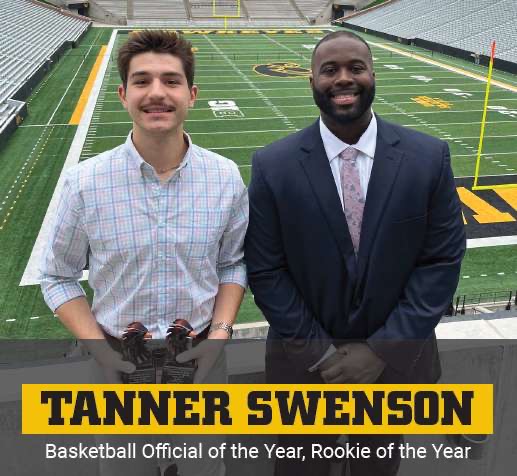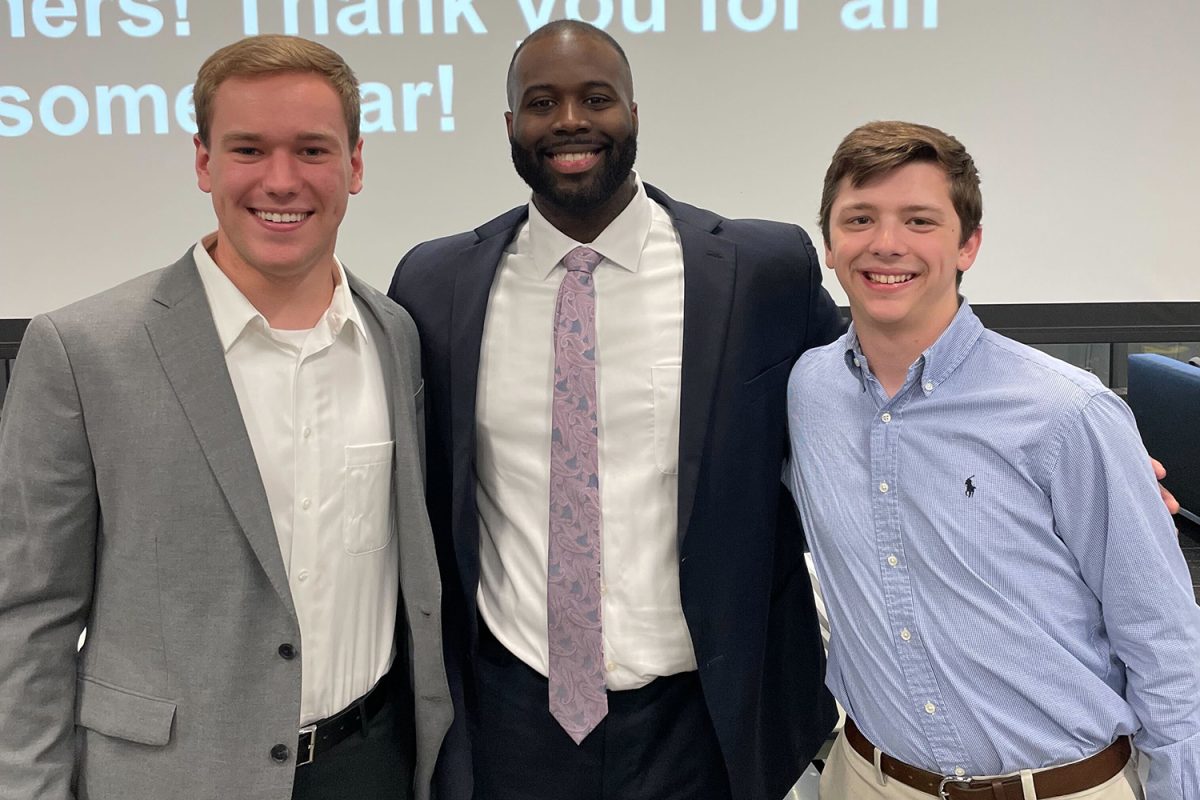The shortage of high school sports officials across the country is an increasing problem.
A 2022 survey by the National Federation of State High School Associations indicated that approximately 50,000 individuals have stopped officiating since the 2018-19 season.
The shortage is partly due to referees’ old age, as the average high school official is 50 years old, according to a 2020 survey conducted by Officially Human.
Three University of Iowa students are trying to reverse this trend and encourage young adults to start officiating.
Spencer Hintz, Andrew Kloser, and Tanner Swenson became the youngest officiating crew to referee a varsity basketball game in Iowa High School history on Dec. 8.
With a combined age of 62 years old, the trio officiated the girls and boys varsity basketball games between Louisa-Muscatine and Hillcrest Academy. The previous record was a combined age of 63 set in 2020.
“I think we all knew we were young just based on the coaches greeting us. They usually mentioned it,” Swenson said. “I’m not sure we knew we were the youngest ever. I don’t think personally it means much to me because I just try to go out and be the best official I can every night.”
Hintz and Kloser, who are roommates, both got involved with officiating their first year on campus. Hintz wanted to find a part-time job and saw a listing for intramural sports officiating through UI Recreational Services.
Hintz invited Kloser to come with him to an informational meeting. They then attended a training session for basketball, and their officiating careers took off from there. Hintz and Kloser admitted they first got into officiating for some extra money and never expected to take it this far.
Swenson got involved with officiating through a high school friend but started taking it more seriously once he got involved with intramurals at the UI. This is where he met Hintz and Kloser, who were his bosses when he first started. The trio became good friends and have grown their skills on the court together over the last two years.

“It is very important that we have younger officials start to join the ranks,” John Mathias, executive secretary for the Iowa City Athletic Officials Association, told The Daily Iowan. “I think the average age of a high school basketball official in Iowa is somewhere around 57 or 58 years old, and that’s not very sustainable over the next few years.”
Matthew Schaefer, assistant director of sports programs for UI Recreational Services, said joining the intramural officiating crew, even if a student has no previous experience, is a great way to learn base-level skills and gain confidence. He said about 50 intramural officials are hired each year to work sports like basketball, flag football, softball, volleyball, and soccer.
Schaefer said there’s an elective course through the sports and recreation management program that he teaches called Sports Officiating Rules/Theories/Issues. This course is another way to get your foot in the officiating world, but Schaefer emphasized that even if you don’t work for UI intramurals or take his class, you can still get certified with the Iowa High School Athletic Association.
“We’ll train you and get you experience through working in some real games,” Schaefer, who has worked for UI Recreational Services for six years, said. “Once you have that base level experience, then we try to promote you so you can also do this for local high schools or junior high. So getting involved with intramurals is a great way to get started.”
Mathias said the Iowa City Athletic Officials Association has a close relationship with the UI Sports and Recreation program and has had several students join the association, including Hintz, Kloser, and Swenson.
“They have a great training program, good mentors, and good evaluation,” Mathias said. “We know when students are coming in and joining our association and they’ve already been working some of those intramural games, that they are sound on the rules and the mechanics of the game and come up pretty much ready to work.”
Mathias said association members get to sign up for the lower-level games they want to work. For varsity games, Mathias said he and his team are “a little more thoughtful” when assigning officials. They try to spread around varsity games to as many members as possible but also assign qualified officials. Mathias said he believed Hintz, Kloser, and Sweson had sufficient skills to work a varsity game.
Schaefer said the four main skills that make a good referee are knowledge of the rules, conflict management, communication, and confidence.
He said an official being able to handle conflict and showing confidence in every call made is important because of fan criticism and bad sportsmanship, something he thinks keeps getting worse and is a big reason for the official shortage.
“Perception is everything, ” Schaefer said. “So even if you’re the world’s best official, but you’re perceived by coaches and players and fans to be unconfident or a little timid, you’re perceived to not be a very good official.”
Schaefer added a referee shouldn’t let a bad game or two push them away from the profession, but it happens often. One of the reasons why he thinks Hintz, Kloser, and Swenson have come so far is because of their eagerness to learn and correct mistakes.
“It’s really important that an official continues their development throughout their career. And so with these three guys, they want to get better … Whenever they work games, they have fun, and that’s seen by the players and coaches and everyone else,” Schaefer said. “I think this group of three young men will really be successful if they continue to stick with it and work together.”
The three students said they were more excited than nervous to work their first varsity game and were ready to prove they could do a quality job despite their age. While they thought both games went well, the trio said there is always more to learn.
Mathias, who has officiated several sports, said he thinks basketball is the most challenging sport to work. Even though basketball rules are relatively simple, having to make split-second decisions consistently and fairly requires skill.
“It’s one thing to know the rules by the book but a completely different and much harder skill to apply them during a game correctly and effectively,” Swenson said.
Schaefer said if someone gets certified, they’re constantly being asked to pick up games and work several nights per week. It is a big time commitment and another reason why the older population is quitting the profession to spend more time with their families.
Hintz said he appreciates referees a lot more now that he is in their position and thinks his group will be assigned to more varsity games in the future. The three have officiated a few junior varsity games, including the Iowa City High boys against Dubuque Senior and Iowa City High girls versus Wahlert Catholic.
Hintz and Kloser said they are in it for the experience right now but aren’t opposed to continuing once they graduate. As for Swenson, he plans on officiating “a long time” on top of his intended career.
“Hopefully this will encourage others our age to start officiating because the state is short of officials now,” Swenson said. “It’s only going to get worse if people our age don’t spark an interest.”



